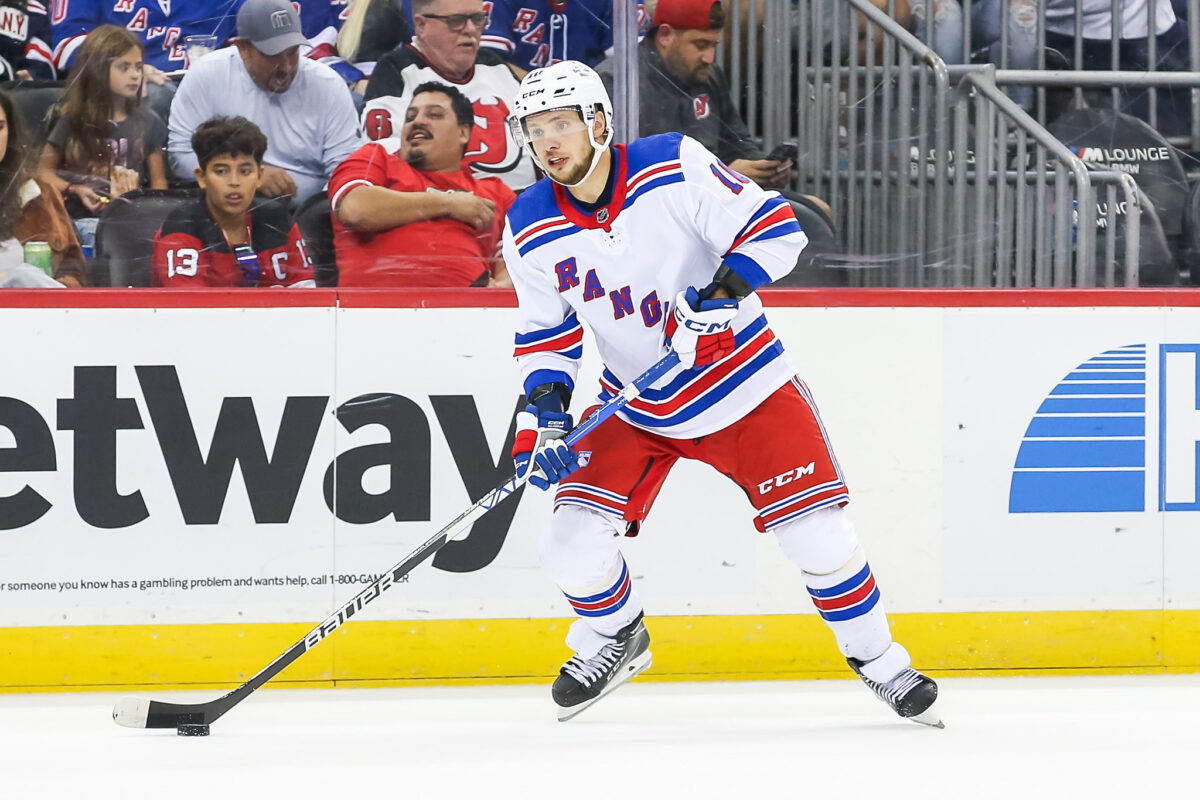Sam Reinhart had an outrageous 57-goal season in 2023-24. But for as great as he was, that likely won’t happen again this coming season. Let’s look at him and nine other skaters who may be due for some regression in 2024-25.
Sam Reinhart
Reinhart was one of the best stories in the NHL a season ago, totaling 57 goals and 94 points, both of which were comfortably career-highs. He was instrumental in helping the Florida Panthers capture their first Stanley Cup championship, and they rewarded him with an eight-year extension at an average annual value (AAV) of $8.5 million.
While Reinhart is worth that AAV, don’t expect him to hit 57 goals again. That was 24 goals above his previous career high of 33, and he shot 24.5 percent to get there, an unsustainably elevated number. Reinhart is a 15.6 percent shooter for his career, so I expect him to regress somewhere toward that number this season. He should still be highly productive and total around 30-35 goals, but 50-plus goals doesn’t seem likely.
Brock Boeser
Like Reinhart, Brock Boeser was one of the great stories of the 2023-24 season, especially with what he went through in his personal life. He had a career year, totaling 40 goals and 73 points in 81 games. But also like Reinhart, how he got there seems a bit unsustainable.
Related: 5 NHL Teams Who Could Regress in 2024-25
Boeser shot 19.6 percent last season, well above his career average of 13.8 percent. The most goals he had totaled in a season before 2023-24 was 29 as a 20-year-old rookie. He’s averaged 31 goals per 82 games for his career, so the regression probably won’t hit as hard as it might for Reinhart. But I wouldn’t bank on him to score 40 again.
Teuvo Teravainen
One of multiple additions the Chicago Blackhawks made this offseason, Teuvo Teravainen is coming off a highly productive season with the Carolina Hurricanes that saw him total 25 goals and 53 points in 76 games. That production is in line with his career averages, but I still see one red flag.
If you guessed shooting percentage again, you’d be correct. Teravainen netted 25 goals on a 17.6 shooting percentage, comfortably above his career average of 10.7 percent. His shot generation has fallen off a bit over the last two seasons, with him totaling 144 and 142 shots on goal. I don’t think he’ll total 25 goals on 140-145 shots on goal again, even if his primary center is Connor Bedard.
Artemi Panarin
I admittedly had a tough time putting Artemi Panarin here because there aren’t many indicators he could regress this coming season. His 16.2 shooting percentage was 1.8 points higher than his career average, and his individual point percentage (IPP) of 83.33 percent was close to his career average, too.

If there’s one reason I see Panarin coming back to Earth in 2024-25, it’s that it’s hard to repeat a 49-goal, 120-point season. Panarin has totaled 90-plus points comfortably three times in his career, so that’s what regression could look like for him. That shouldn’t cause problems for the New York Rangers, who still look like Metropolitan Division favorites, but it may just come with a slightly less productive Panarin.
Gustav Nyquist
Were you aware Gustav Nyquist had a 23-goal, 75-point season in 2023-24? Because I sure as heck wasn’t before writing this article. While he’s always been a solid player, Nyquist has generally produced in the 45-55 point range for his career. And that’s where I’d expect him to regress this coming season.
Nyquist’s shooting percentage of 15 percent wasn’t unsustainably high compared to his career average (11.8 percent). Nor was his IPP of 69.64 percent, but like Panarin in a sense, I’d be surprised if Nyqust repeated a career year he hasn’t come close to completing before. He’s still a good player, and maybe coach Andrew Brunette’s system favors Nyquist exceeding expectations, but that’s not a bet I would make. There are decent odds he falls back into the 50-point range.
Mike Matheson
Perhaps it’s because the Montreal Canadiens weren’t any good a season ago, so this didn’t get any attention, but Mike Matheson had a tremendous 2023-24, totaling 11 goals and 62 points in 82 games. The 11 goals aren’t the unsustainable part; he’s netted double-digit goals a couple of times in his career. It’s the 51 assists that may be an area where he could regress.
The reason I see Matheson regressing is only 21 of his 62 points came at five-on-five, while 29 were via the power play. He had never totaled more than nine points on the man advantage before 2023-24, granted his usage on the power play (303 minutes) was the most of his career by a country mile. Perhaps that means his scoring output may be a bit more sustainable if his power-play usage remains around 300 minutes. Time will tell, but he seems like someone who will fall back into the 40-point range.
Blake Coleman
The Calgary Flames weren’t much good last season, but Blake Coleman did have an excellent 2023-24, totaling 30 goals and 54 points in 78 games. His possession numbers were great, and he’s among the Flames’ best two-way forwards. However, a repeat 30-goal season seems like a stretch.
Coleman doesn’t shy away from shooting the puck, but he still shot 15.7 percent last season, a decent step above his 10.4 percent career average. He totaled 20-plus goals in 2018-19 and 2019-20 with the New Jersey Devils but hadn’t surpassed that number until last season. I’d expect him to fall back into the 15-20 goal range this season, especially since the Flames might be in for another tough campaign.
Jonathan Marchessault
The Nashville Predators were the talk of the NHL offseason, given their splashy spending spree. Jonathan Marchessault was among the big-name free agents they signed this offseason after the Vegas Golden Knights let him walk in free agency. He’s coming off a 42-goal season, the best of his career, but I’m not sure that’s repeatable.
Marchessault’s 15.8 shooting percentage last season was only 4.2 points higher than his career average, and he’s consistently flirted with the 30-goal mark, hitting that number in 2016-17 and 2021-22. Still, I wouldn’t bank on him hitting 42 tallies again.

Even though Marchessault’s overall shooting percentage wasn’t unsustainably high, his 14.29 shooting percentage at five-on-five was the second-highest of his career. He’s been in the nine to 11 percent range at five-on-five over the last three seasons, so that could make him a regression candidate, though he’ll probably still be quite productive for the Predators.
Zach Hyman
I love Zach Hyman and what he brings to the Edmonton Oilers. He’s also the king of scoring goals from within a foot of the net, so him putting up some gaudy goal totals again isn’t out of the question. Still, repeating a 54-goal campaign is incredibly difficult to do.
There are some signs Hyman could regress, too; his 18.6 shooting percentage was above his 13.7 percent career average. He’s probably still in line for a big season since he spends so much time alongside Connor McDavid. I wouldn’t even rule out 40 goals, but he probably settles between 35-40 tallies by the end of the season.
Mackenzie Weegar
Mackenzie Weegar has always been one of the more underrated top-four defenders in the league, and it still feels like that’s the case after his impressive 2023-24 season. It may have gone unnoticed, but Weegar finished with 20 goals and 52 points in 82 games for the Flames a season ago.
Unfortunately for Flames fans, he might be due for regression, too. It’s not necessarily the 52-point part that suggests he could come down to Earth; he did total 44 points in 2021-22. It’s the 20 goals that I’m not sure Weegar can repeat.
Before 2023-24, Weegar had never potted more than eight goals in a season. A 9.6 shooting percentage is pretty high for a defenseman and was above his 5.7 percent career average. The Flames will probably ask plenty of him offensively, meaning he might put up points again, but he might not hit 20 goals again.
Regression Doesn’t Mean Turning Into a Pumpkin
Just because a player may regress doesn’t mean they’ll turn into a pumpkin following a career year or some unsustainably high percentages. It just means they’ll revert to the mean and fall back in line with their career averages, which seems like a decent possibility for these ten skaters.
* * *
Advanced stats from Natural Stat Trick
